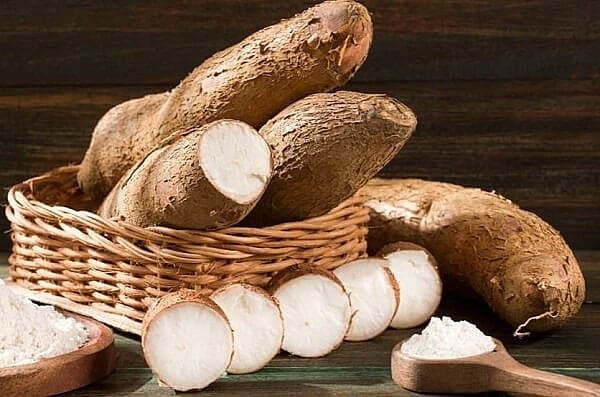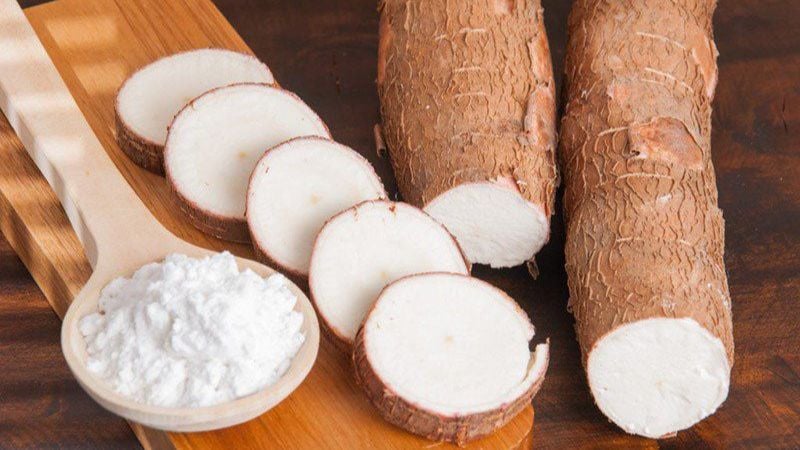Preliminary data from the General Department of Customs shows that as of the end of November this year, Vietnam had exported over 2.3 million tons of cassava and cassava-based products, earning over $1.04 billion.
Despite a 13% decrease in volume and a 10% decrease in value compared to the same period last year, cassava and its products remain among the nine agricultural commodities with an export turnover of over $1 billion.
Currently, China is the main consumer market, accounting for more than 91% of Vietnam’s total cassava and cassava product exports.
Vietnamese people grow cassava not only to meet domestic consumption needs but also for export. However, the prices remain very reasonable. According to the Vietnam Cassava Association, during the current harvest season, the cassava supply to factories is increasing. From early November to mid-December, the purchasing price of cassava roots in some provinces in the Central and Highlands regions ranged from 1,900 to 2,300 VND/kg, while the purchasing price of fresh cassava in the North was about 2,000 to 2,050 VND/kg.

Vietnamese people grow cassava for both domestic consumption and export, but the prices remain affordable.
Nutritional Value of Cassava
Cassava is a starchy root vegetable with a distinctive delicious flavor. It is a good source of energy and also provides dietary fiber, vitamins, and minerals. Specifically, 100g of cassava contains approximately 27g of carbohydrates, 1g of fiber, along with small amounts of protein, fat, sugar, sodium, thiamine, phosphorus, calcium, and riboflavin. Additionally, boiled cassava also offers a small amount of vitamin C, niacin, and iron.
Health Benefits of Cassava
Cassava is not only a tasty food but also offers numerous health benefits to consumers. Here are some key highlights:
– Reduced Risk of Metabolic Syndrome: Metabolic syndrome encompasses health issues such as high blood sugar, increased cholesterol, and large waist circumference, which elevate the risk of diabetes and cardiovascular diseases. Cassava, being rich in flavonoids and fiber, helps protect the body against this syndrome and its associated complications.
– Enhanced Wound Healing: Cassava is an excellent source of vitamin C, a crucial precursor in collagen production, which is essential for skin tissue regeneration. Consuming vitamin C-rich foods improves the body’s healing abilities.
– Preventing Malnutrition: For those living in developing countries, cassava can be a valuable solution to combat malnutrition. Cassava plants are drought-tolerant and pest-resistant, yielding high production, making them a precious food reserve when other crops become scarce.
– Lowered Blood Pressure: With its high potassium content, cassava helps reduce blood pressure and maintain sodium balance in the body, thereby contributing to cardiovascular health.

Cassava’s high potassium content helps lower blood pressure and maintain sodium balance, supporting cardiovascular health.
Important Considerations When Consuming Cassava
Cassava is a nutritious food, but it’s important to note that the roots and leaves contain a substance called cyanogenic acid, which is toxic. This toxin is present in the highest concentration in the peel, the fibrous core, and the ends of the roots, and it can cause serious poisoning or even death. All varieties of cassava contain cyanogenic acid, with average levels ranging from 3mg% to 5mg%. Bitter cassava varieties tend to have higher levels of this acid, reaching up to 10-15mg%.
Therefore, proper processing of cassava is crucial to avoid poisoning. Symptoms of cassava poisoning can vary from mild to severe, depending on the amount consumed. Some common symptoms include:
– Digestive Disorders: Nausea, abdominal pain, vomiting, and diarrhea.
– Neurological Disorders: Dizziness and headaches. In severe cases, symptoms may include rigidity, seizures, dilated pupils, and even coma.
– Respiratory Disorders: Breathing difficulties, cyanosis (blue discoloration of the skin), and respiratory failure leading to the risk of death.
However, the toxic compound in cassava is highly volatile and quickly dissolves in both cold and hot water. When oxidized or combined with sugar cane, this toxin becomes non-toxic. Based on these characteristics, proper processing can eliminate most of the toxins in cassava.
To detoxify cassava, it is recommended to follow these steps:
– Refrain from using bitter cassava and high-yield cassava (both roots and leaves) in food preparation.
– Peel off the pinkish outer layer and cut off the ends of the roots.
– Soak the cassava in clean water for several hours, making sure to change the water periodically.
– Keep the lid open when cooking to allow the toxic gases to escape.
– Children under 3 years old should not consume cassava.
– Avoid consuming large amounts of cassava on an empty stomach.
– When eating cassava, combine it with sugar or honey to reduce the risk of poisoning.
– If you detect a bitter taste in the cassava, discard it immediately, as bitterness indicates higher levels of cyanogenic acid.
The Secret Benefits and Dark Side of Eating Vietnamese Coriander: Do You Really Know?
Vietnamese coriander, a familiar herb in many Vietnamese households, boasts a plethora of health benefits. However, like any other herb, it can also cause harm if consumed incorrectly or in excess. Unveiling the lesser-known adverse effects of this herb, we aim to empower you with knowledge to use it wisely and safely.





































